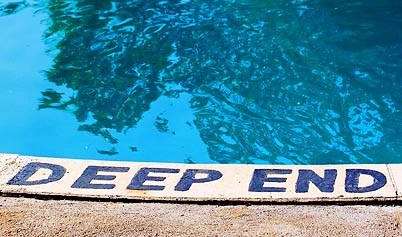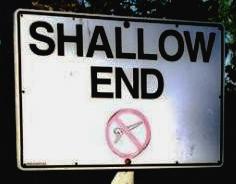Deep Reading
As a kid, you learned to swim in the shallows and eventually took a dive into the deep end of the pool, lake or ocean. School and life taught you that some things are “deep” and that some people can be shallow.
This post isn’t about that. Or maybe it is.
Nicholas Carr wrote a piece in the Atlantic Monthly called “Is Google Making Us Stupid?” that caused a lot of discussions, especially with educators and technology types. Then he wrote a book out called The Shallows: What the Internet Is Doing to Our Brains that looks at some neurological science in an attempt to see the impact of computers and the Net on our brains.
I love to read about the brain and this book has stories about experiments that I find interesting (though not always convincing). Can we really see a difference between those neural pathways that form when we are reading books versus those created when we read online? Is Net reading with its surfing and skimming that lead you from a story to an image to a video to something else and distracting you with popups, messages, alerts, and feeds.
I have heard all my life that interruptions and distractions kill my comprehension and retention. My parents told me. My teachers told me. My wife still tells me to put down the iPad while I’m watching TV.
“Deep reading” is a good thing for your brain. Right? I learned about that as a teacher of literature. “Habits of mind” is another term that came into my teaching life. Some of the habits of mind are: persisting, managing impulsivity, and striving for accuracy and precision. If you look at the list of those habits, you can see that technology and especially the Net is probably changing some of these habits – or creating new ones.Carr feels the changes are not positive ones.
Habits such as being open to continuous learning, thinking flexibly, thinking interdependently (learning with others) and applying past knowledge to new situations might actually be encouraged by Net use.
I wonder what the difference is when you read Carr’s books on a screen versus on paper?
Education really loves the ability to concentrate. I think Carr is more concerned with our everyday habits than with the classroom. And we all have seen those statistics about the amount of time we spend in classrooms versus the time we spend online, watching TV, sleeping, and at other activities. Classrooms always lose.
Yet, Carr likes technology. He liked those first Apple home computers and social networking, blogging, YouTube and toys that allows people to stream music and movies throughout your home. But he does want to warn us of what he feels is being lost.
His argument includes brain research and also Plato and Marshall McLuhan as evidence. The controversial part is the idea that the Internet literally and physically rewires our brain. That brain becomes more computer-like and is better at consuming data. We’re becoming better at swimming in shallow water.
A surprisingly large section of the book is devoted to the history of the written word and all that it has done to “mold the human mind.” The argument is an old one. Check into Plato.
 The past week I have been doing more “deep reading.” That is “sustained, unbroken attention to a single, static object.” I have been reading (like much of the world) Stieg Larsson’s Millennium Trilogy. (I just finished The Girl with the Dragon Tattoo this weekend, and yes, I like it.) You might argue that those books are not “deep” but that’s not the point. The deep comes from the way you read.
The past week I have been doing more “deep reading.” That is “sustained, unbroken attention to a single, static object.” I have been reading (like much of the world) Stieg Larsson’s Millennium Trilogy. (I just finished The Girl with the Dragon Tattoo this weekend, and yes, I like it.) You might argue that those books are not “deep” but that’s not the point. The deep comes from the way you read.
And I do tend to read print books differently. I have been sitting outside in my Adirondack chair with a cup of tea and focusing on the book. I even moved the chair off the deck yesterday because I was picking up the sounds of the TV from inside the house.
Carr’s argument is that the Internet works against that kind of focus.
“Dozens of studies by psychologists, neurobiologists, educators and Web designers point to the same conclusion: when we go online, we enter an environment that promotes cursory reading, hurried and distracted thinking, and superficial learning.” Sure, deep reading is possible, but that’s not the kind of reading “the technology encourages and rewards.”
Is the book pulling me away from my laptop, phone, and iPad? Not really. I need them for work and to survive the day it seems. But I am being more mindful of occasions for deeper reading.
I am also thinking about how a deeper “reading” of other things – relationships, for example – might be something I need to consider too.
It’s wisdom over knowledge. It’s using the technology, but more intelligently.

Comments
No comments